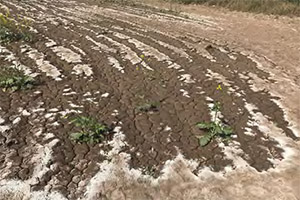Sustainability
- Home
- Locations
- What you can do
- LiFE Framework
- Sustainable Development Goals
- About us
- Grants
- Events
- Contact us
Now searching for:

Salinity-affected cropping paddocks in the Indus Basin.
A multi-stakeholder multi-million dollar project led by Charles Sturt researcher, Dr Michael Mitchell, continued to help Pakistan tackle salinity in agricultural landscapes holistically by engaging with farmers, using Australia’s experience as a guide.
“Australia has had a long experience working with the issue of salinity and appreciates that farmers and landholders can themselves take measures to manage salinity,” Dr Mitchell said. “A key clincher for this project’s development was bringing people out from Pakistan to meet some of the longer-living Landcare groups in the Murray-Darling Basin.”
The current project forms the start of a long-term research program across Pakistan’s salinity affected landscapes, bringing in a wider range of partners.
“We have engaged people in-country who are going to work with salinity-affected communities,” Dr Mitchell said. “For example, we are partnering with the International Union for Conservation of Nature to explore adaptation options involving mangrove rehabilitation.
“With them, we will work with Dabla Tappan, a coastal village in the Indus Delta of southern Sindh province, whose livelihoods have been devastated by increased salinity from seawater intrusion exacerbated by reduced Indus River outflows and climate change.”